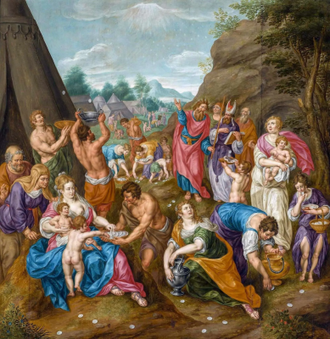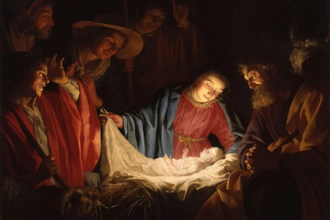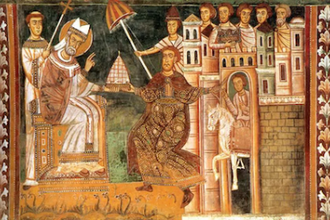Gospel in Art: Your fathers ate the manna in the wilderness

Israelites gathering the Manna from Heaven, by Hendrick de Clerck, oil on panel, painted circa 1620's © National Museum of Warsaw, Poland
Source: Christian Art
Gospel of 8 May 2025
John 6:44-51
At that time: Jesus said to the crowd, 'No one can come to me unless the Father who sent me draws him. And I will raise him up on the last day. It is written in the Prophets, "And they will all be taught by God." Everyone who has heard and learned from the Father comes to me - not that anyone has seen the Father except he who is from God; he has seen the Father. Truly, truly, I say to you, whoever believes has eternal life. I am the bread of life. Your fathers ate the manna in the wilderness, and they died. This is the bread that comes down from heaven, so that one may eat of it and not die. I am the living bread that came down from heaven. If anyone eats of this bread, he will live for ever. And the bread that I will give for the life of the world is my flesh.'
Reflection on the painting
Hendrick de Clerck was a Flemish painter active in Brussels during the late 16th and early 17th centuries, known for developing his distinctive Mannerist style. Mannerism emerged as a reaction to the ideals of artists like Leonardo da Vinci and Michelangelo, who championed harmony, proportion, naturalism, and balanced beauty. The Mannerists took these ideals and deliberately exaggerated them, resulting in works that were often highly stylised, with elongated figures and an almost otherworldly elegance. The term "Mannerism" itself comes from the Italian word maniera, meaning "style" or "manner," reflecting this focus on sophisticated artistry over strict realism.
In this particular painting, de Clerck masterfully weaves together both Old and New Testament themes. In the top left corner, we see manna falling from heaven, being caught and gathered by figures below, while others distribute it to those in need, recalling God's providence in feeding the Israelites in the wilderness. To the right stands Christ, observing the scene, His presence linking the Old Covenant to its fulfilment in the New. De Clerck presents a theological reflection through imagery: the manna, once the miraculous sustenance from heaven, is now revealed in Christ as the true and living bread. Notice how the manna is depicted: remarkably similar in size and shape to the Eucharistic hosts we use today, subtly pointing to the continuing gift of divine nourishment in the Mass. This visual connection invites us to recognise that what was foreshadowed in the desert is fully realised in the person of Jesus.
In today's Gospel, Jesus makes a profound and startling declaration: "Whoever believes in me has eternal life." He doesn't say will have, as if eternal life is only a distant promise after death, but has (present tense). This reminds us that eternal life begins here and now, for those who live in communion with Christ. Through faith and through being nourished by his body-the true manna from heaven-we already participate in the divine life that never ends. Each time we receive the Eucharist, we are not simply remembering a past event or awaiting a future hope; we are drawn into the living reality of God's Kingdom, here and now! De Clerck's painting, with its union of Scripture and sacrament, illustrates how God feeds His people still, offering us today the bread that sustains not just for a lifetime, but for eternity.
LINKS
Gospel in Art: https://christian.art/
Today's Reflection: https://christian.art/daily-gospel-reading/john-6-44-51-2025/ (with audio)


















